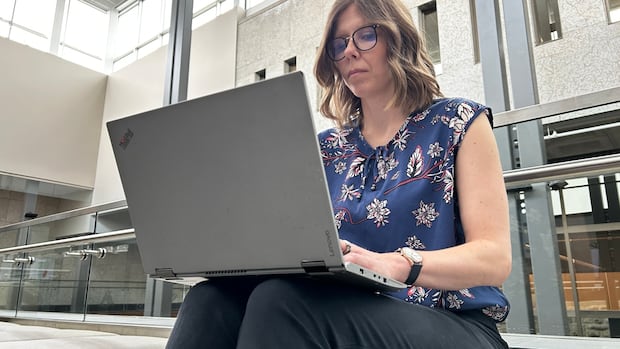Some academics in Saskatchewan say they are turning their backs on travel south of the border as the U.S. political landscape continues to shift under the policies of President Donald Trump.
Wendy Verity told CBC and Radio-Canada this month she’s had to carefully consider her options: pursue career opportunities or stand in solidarity with Canada.
Verity, a doctoral student in the department of community health and epidemiology at the University of Saskatchewan, was accepted to attend a sports medicine conference in the United States in May.
“I’m late in my PhD program, so I’m going to graduate soon and so this is kind of part of building a CV and forming research networks,” she said.
“The opportunities to present my work are shrinking.”
‘We have to think twice’
It’s a decision more academics are grappling with as they deal with changing immigration policies in the United States and threats to academic freedom from President Donald Trump.
Nazeem Muhajarine, a professor of community health and epidemiology at the University of Saskatchewan, said he recently declined an invitation to attend a conference in Atlanta, Ga.
Although he has a Canadian passport, the Sri Lankan-born academic fears facing potential repercussions if he stays in the United States.
Muhajarine said the stricter policies put in place by Trump made him feel unsafe about traveling to Georgia.
“At times like this I think we have to think twice about the decisions we make, and hopefully a time will come when things will get back to the way they were,” said Muhajarine.

Academics may not be the only ones reconsidering travel south of the border.
Data from U.S. Customs and Border Protection (CBP) data shows the the number of cross-border travellers going from Canada to the U.S. dropped by nearly 900,000 in March compared to the same month last year
For Muhajarine, it’s about putting his money where his mouth is.
“I really don’t want to be part of the economy there. I don’t want to spend my money in the U.S.,” he said.
‘Unprecedented’
Matthew Mitchell, vice-chair of the University of Saskatchewan Faculty Association, describes the challenge posed to Canadian academics by the new American policies as “unprecedented.”
“Canadian professors who are quite privileged in many respects, who have many protections for the most part, who value academic freedom, freedom of expression, who are now very concerned about the prospects of going to the United States,” said Mitchell.
Not every academic is making the choice, but it is something many are now having to consider, Mitchell said.

Mitchell said academic conferences can be “very important” for students or young professors who are just launching their careers. The events offer the opportunity to network and make connections for employment opportunities.
Mitchell points to the use of video conferencing that was deployed during the COVID-19 pandemic as a possible solution to the issues posed by the Untied States’ policies.
The faculty association has not taken a position on any boycott.
The Canadian Association of University Professors has recently issued a warning to its members, urging caution when traveling to the United States and asking them to travel there “only if it is essential and necessary.”
The University of Regina and University of Saskatchewan told CBC News and Radio-Canada they were not aware of any incidents happening to their employees during travel in the United States.
The University of Saskatchewan acknowledged that concerns have been raised by some of its employees. It has provided its employees with Canada’s latest recommendations for travelers to the United States.
Tough decisions ahead
Muhajarine admits the decision may affect the development of research and the sharing of knowledge between academics based in the U.S. and Canada.
The professor regrets not being able to “interact freely” with colleagues.
“When you go to a conference, you interact with people about your presentation and their presentation. This is how knowledge is tested,” he said.
“Your colleagues ask you questions and that’s how knowledge is refined.”
Verity, the doctoral student, made her own choice this week.
She confirmed to CBC and Radio-Canada that she will be foregoing to the opportunity to present her research in the United States.
